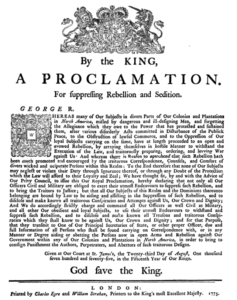Good morning, Whitewater.
Tuesday in town will be partly cloudy with a high of eighty. Sunrise is 6:11 AM and sunset is 7:42 PM, for 13h 31m 29s of daytime. The moon is a waning gibbous with 69.1% of its visible disk illuminated.
Tokyo will host the next Summer Olympic Games, in 2020, and it’s likely to be quite an event (and that really is the Prime Minister of Japan, Shinzo Abe, appearing as video-game character Mario toward the end of the clip):
On this day in 1775, King George declares the American colonies in a state of rebellion:
The Proclamation of Rebellion, officially titled A Proclamation for Suppressing Rebellion and Sedition, was the response of George III of Great Britain to the news of the Battle of Bunker Hill at the outset of the American Revolutionary War. Issued August 23, 1775, it declared elements of the American colonies in a state of “open and avowed rebellion.” It ordered officials of the British Empire “to use their utmost endeavours to withstand and suppress such rebellion.” The Proclamation also encouraged subjects throughout the Empire, including those in Great Britain, to report anyone carrying on “traitorous correspondence” with the rebels so that they could be punished.
The Proclamation was written before Colonial Secretary Lord Dartmouth had been given a copy of the Olive Branch Petition from the Continental Congress. Because the king refused to receive the petition, the Proclamation effectively served as an answer to the petition.[1]
….The Second Continental Congress issued a response to the Proclamation on December 6, saying that while they had always been loyal to the king, the British Parliament never had any legitimate claim to authority over them, because the colonies were not democratically represented. Congress argued that it was their duty to continue resisting Parliament’s violations of the British Constitution, and that they would retaliate if any supporters in Great Britain were punished for “favouring, aiding, or abetting the cause of American liberty.” Congress maintained that they still hoped to avoid the “calamities” of a “civil war.”
The Proclamation and the Speech from the Throne undermined moderates in the Continental Congress like John Dickinson, who had been arguing that the king would find a way to resolve the dispute between the colonies and Parliament. When it became clear that the king was not inclined to act as a conciliator, colonial attachment to the Empire was weakened, and a movement towards declaring independence became a reality, culminating in the United States Declaration of Independence on July 4, 1776.
A Google a Day asks a geography question for Tuesday: “What famous Alexandrian was responsible for the most popular map printed from movable type in the fifteenth century?”

